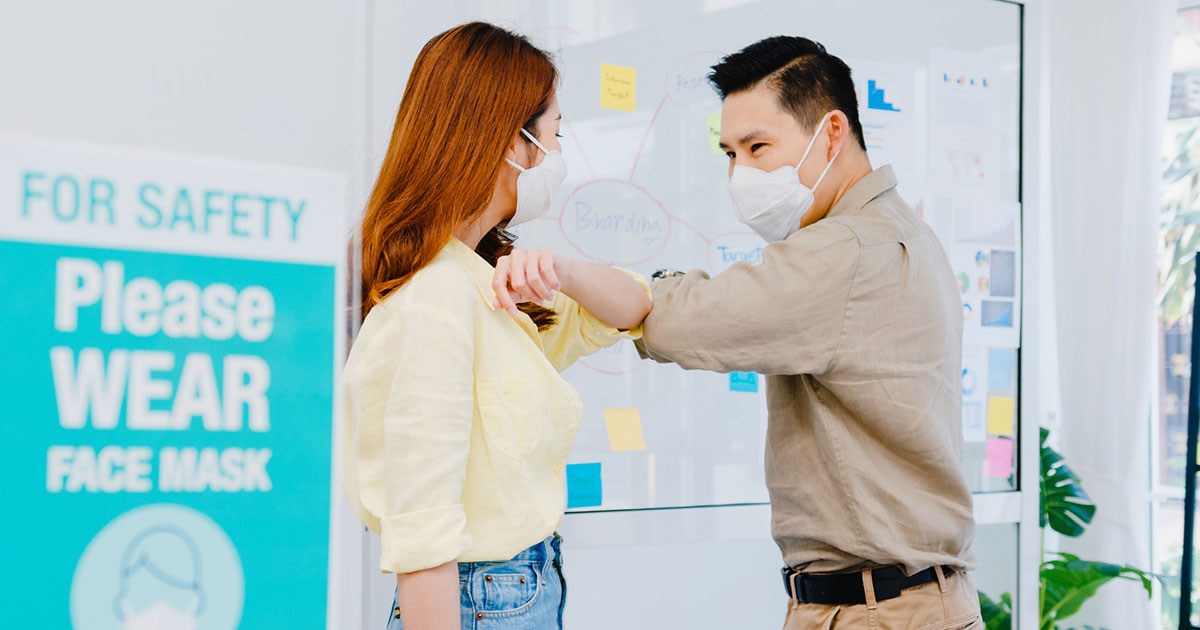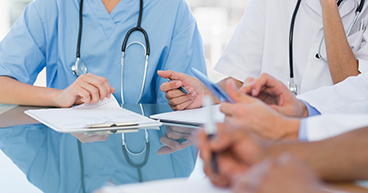
Sticking with your cancer treatment regimen is essential to fighting the disease. So, it’s important to be educated about health and safety risks that could cause delays to your treatment and affect your quality of life.
Slips and falls may occur when you’re weak or fatigued from surgery or a recent chemotherapy or radiation therapy treatment. Intestinal infections from bacteria-carrying foods, like undercooked meat, may become serious if you have a compromised immune system. Patients undergoing cancer treatment are also at increased risk of severe illness from viruses, including the virus that causes COVID-19, according to the U.S. Centers for Disease Control and Prevention (CDC).
It’s no wonder staying safe while going through treatment may seem overwhelming. But you can take an active role in maintaining your health while fighting cancer by educating yourself about these common health and safety risks.
Health care-associated infections
On any given day, about one in 30 hospital patients has at least one healthcare-associated infection (HAI), according to the CDC. Some of the most common HAIs include surgical-site infections, urinary tract infections (often caused by irritation to the urethra or bladder by catheters used during and after surgery), bloodstream infections and Clostridioides difficile, also called C. diff (often caused by antibiotics in those with weakened immune systems).
“Hospitals have always had safety systems and protocols in place to prevent the most common health care-associated infections,” says Cheryl Young, Director of Quality, Risk and Patient Safety at Cancer Treatment Centers of America® (CTCA), Phoenix. For example, CTCA® trains and assesses all its health care employees in the “We ARE Safe” program, which includes specific safety behaviors like clear communication and protocols for essentials like proper use of personal protective equipment (PPE).
To make sure you’re doing what you can to prevent HAIs, Young recommends these tips:
- Ask your health care providers what they’re doing to keep you safe from infection. Don’t be afraid to speak up.
- If you’re scheduled for surgery, ask your doctor what the health care team does to prevent infection during and after surgery.
- If you have a catheter, ask if it’s necessary every day. The longer a catheter remains in your bladder, the greater the risk of infection.
- Recognize the signs of skin infection. Redness, draining or pain around the surgical or catheter site are signs of infection and should be reported to your care team immediately. A fever may accompany these symptoms.
- Watch for diarrhea, which can be a sign of C. diff. If you have diarrhea three or more times in 24 hours, tell your doctor, especially if you’re taking an antibiotic.
- Maintain good hand and body hygiene. Wash your hands often and shower or bathe regularly.
- Keep wounds clean and covered until healed.
Viruses, including COVID-19
Cancer patients are at higher risk of contracting viruses that cause the flu, pneumonia and COVID-19. It’s important to stay current on all vaccinations, as recommended by your care team, including the COVID-19 vaccine. After being vaccinated, cancer patients should still continue to wear masks, wash their hands frequently and practice safe social distancing, since vaccinations do not provide 100 percent protection.
It’s also important to ensure the facility where you get cancer treatment is following important safety measures. “Since COVID-19, CTCA has been following all CDC guidelines as well as many more safeguards to protect patients and health care workers,” says Kelley McCarthy, RN, BSN, CIC, Infection Prevention at CTCA Phoenix. Cancer patients should feel comfortable asking whether their treatment facility is enforcing these safety measures:
- Symptom and temperature screening of patients, physicians, employees, caregivers and visitors before entering the facility
- A strict masking policy that requires masks to be worn by all health care staff, patients and visitors (except in designated dining areas while eating or drinking)
- Limits on the number of visitors or caregivers to ensure safe social distancing
- Spaced seating throughout the facility to comply with state and local social-distancing protocols
- Enhanced cleaning and disinfecting measures (in sitting areas as well as exam rooms)
- Hand hygiene stations located throughout the facility and patient consultation areas
- Requirements that all health care staff—doctors, nurses and technicians—wash their hands immediately before treating you
“If you don’t observe your care team members wash their hands before walking into your room, you should feel empowered to ask them to do so,” says McCarthy. “No health care worker is going to feel put out; they’re just as concerned as you are about patient safety and want to ensure you’re confident in their safety practices.”
Drug interactions
Cancer patients may be prescribed several medications, many of them new, as part of their treatment regimen, increasing the risk of negative drug interactions. Drug interactions may run the gamut, from annoying itching or hives to life-threatening anaphylaxis.
“It’s important for patients to keep an up-to-date list of the drugs they’re taking, including over-the-counter medications and supplements, and to share it with their doctors and pharmacists,” says Young. “If your pharmacist offers to explain any potential side effects, listen carefully, take notes and ask any questions you may have. That way, you’ll know what to do in case of an adverse reaction.”
Most medications also come with a printed description that includes potential side effects. “So, don’t hesitate to call if you have questions later,” she adds. “The goal is to keep you safe.”
Cancer patients also need to be wary of taking vitamins, supplements or herbs without first talking to a health care professional. Some natural supplements may actually counteract your anti-cancer treatments, including chemotherapy.
“Supplements can be useful, when taken under the guidance of a trained health care professional,” says Daniel Kellman, ND, FABNO, Director of Naturopathic Support and Rehabilitation Services at CTCA Atlanta. “But what many people, especially cancer patients, may not know is that some herbal remedies can actually work against them.”
Slips and falls
At many hospitals, including CTCA, cancer patients are screened for risk of falling, and plans are enforced to reduce your chances of tripping or falling in the hospital and when you’re at home. Most incidences occur when patients get up in the middle of the night to use the bathroom, Young says. Medications that make you feel lightheaded, or simply getting up too quickly, may also put you at risk. To decrease your risk of slips or falls, consider these tips:
- Clear clutter off the floor (pick up newspapers, books, shoes, toys, magazines, etc.).
- Anchor loose telephone, computer and electrical cords.
- Secure or avoid area throw rugs (especially on wood or tile flooring). Use non-skid mats in the kitchen and bathroom.
- Install grab bars by the toilet, shower and tub.
- Use a shower chair and handheld showerhead if you feel unsteady.
- Always keep one hand free to use the handrail when going up or down stairs.
- Use a cane or walker if you feel unsteady, and be sure to keep them in good repair (replace worn rubber tips, etc.).
Foodborne illness
Food safety is important for everyone, but it’s especially so during and after cancer treatment. Foodborne illness (also called food poisoning), which is caused by consuming food tainted with bacteria, can result in severe diarrhea, vomiting and dehydration. Cancer treatments, including chemotherapy, radiation therapy and stem cell transplants, may weaken your immune system, making it difficult for your body to recover from the effects of foodborne illness.
Cancer patients should avoid a number of food items, including:
- Undercooked or raw fish, meat or eggs
- Raw or unpasteurized dairy products, including milk and cheese, and unpasteurized fruit juices
- Unwashed fruits and vegetables
However, a diet rich in fruit, vegetables, grains, beans, lean meat, fish and low-fat dairy are important to help maintain your strength during treatment. Follow these guidelines to help keep your foods safe:
- Wash your hands. Also make sure anyone involved in your food prep does the same.
- Wash all work surfaces. Wipe down your sink and all food prep areas with a weak bleach solution consisting of one tablespoon of bleach and a gallon of water. This kills bacteria and other germs.
- Avoid cross contamination. Keep high-risk foods (raw meats, seafood and eggs) in their own section of your shopping cart, grocery bags and refrigerator, and sanitize surfaces that come into contact with them. Use separate cutting boards for each type of food, or if that’s not possible, sanitize cutting surfaces between preparing produce and meat.
- Refrigerate foods promptly. Refrigerate foods within two hours of purchasing (one hour if it’s over 90 degrees outside). Keep your refrigerator set at 40 degrees or lower, and your freezer at 0 degrees or lower.
- Know safe cooking temperatures. Be sure to check the proper cooking temperatures for meat and seafood, and use a meat thermometer to confirm they’re cooked through. The FoodSafety.gov site recommends safe minimum internal temperatures for cooking meats, poultry, eggs and fish.
“Patients need to be empowered about their safety,” says Young. “Becoming educated about safety is a proactive step you can take to empower yourself.”
Learn why cancer survivors may be at higher risk of severe COVID-19 symptoms.



